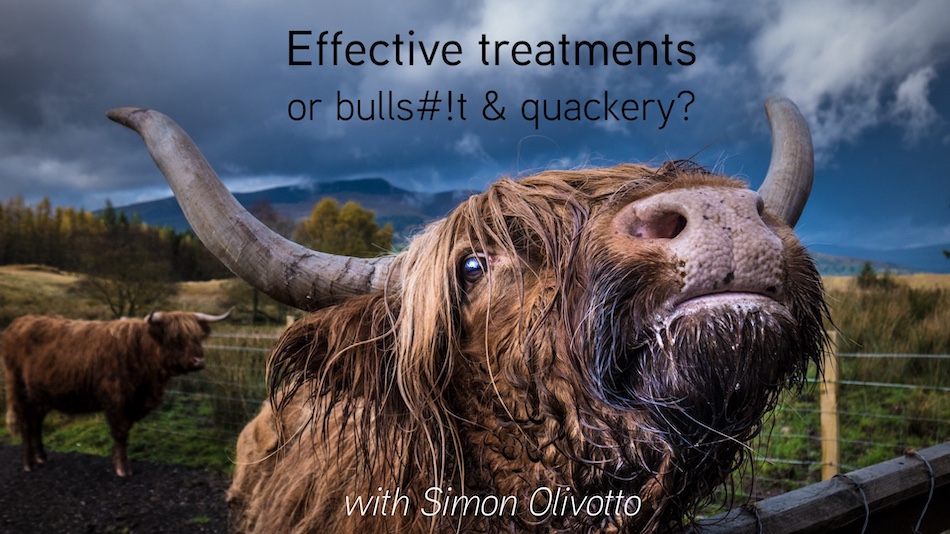How can you choose effective, evidence-based treatment for musculoskeletal pain when the evidence is lacking for a lot of our interventions?
Should we just select treatments that seem to help patients, despite a lack of evidence? Some treatments that appear to be effective, or reported by patients to improve their pain, may not be truly effective or evidence-based at all, and may even be completely bogus.
Even effective, evidence based treatment solutions can drift into the realm of bulls#!t and quackery if we’re not careful with our explanations and treatment delivery.
What differentiates an effective treatment approach from a dubious one?
Now available - Effective treatments or bulls#!t & quackery with Simon Olivotto

With this presentation from Simon Olivotto (Specialist Musculoskeletal Physio, FACP), you’ll understand how your treatments work, so you can choose treatments that are truly effective, match your patient needs and are likely to get the best result with each patient. You’ll discover:
- How common Physio treatments reduce pain, and the limitations of each, including:
- Manual therapy
- Dry needling
- Exercise
- Taping and bracing
- Electrotherapy
- Psychologically informed practice
- Which Physio treatments are effective and evidence-based, and which treatments are bulls#!t and quackery.
- Why bulls#!t & quackery interventions may improve pain in some patients, but why we should avoid these at all costs, even if patients report a positive effect.
Manual therapy
- Is manual therapy evidence-based?
- What’s really happening when your patient improves with manual therapy? Is it the specific grade, force or technique that helps most...or something else entirely?
- How to use manual therapy as part of an evidence informed strategy, incorporating contemporary pain science and the biopsychosocial model.
Exercise
- Exercise is one of our most robust evidence-based interventions. How does exercise help patients in pain?
- Why pain improves even when exercise dose, load and timeframe are too low to change strength or function?
- How to explain exercise therapy to your patients.
- Whether exercise should be painful or painless in managing musculoskeletal pain disorders.
- The relevance of targeting impairments eg. and using symptom modification as part of exercise therapy.
Pain science, placebo and contextual effects
- How to use contemporary pain science in best practice evidence-based care.
- Strategies and clinical tips to enhance the effects of your treatments.
- Contextual effects can make or break your treatment. Explore practical examples of how to harness contextual effects to enhance outcomes and avoid detrimental nocebic influences.
- Placebo - how the placebo effect works.
- How to successfully and ethically harness placebo effects whilst avoiding nocebo effects in your treatments.
Psychologically informed practice, CBT & CFT
- The role of psychologically informed practice in physiotherapy treatments.
- Whether there is any evidence whether psychologically informed practice is really better than other treatments for reducing pain.
- The basic principles of cognitive behavioural therapy (CBT), cognitive functional therapy (CFT) and acceptance and commitment therapy (ACT) approaches to treating pain.
- How to incorporate 5 key principles from Peter O’Sullivan’s CFT paper into your practice.
- When to refer to psychologists and multidisciplinary pain management.
Improve the effects of your treatment
- Strategies to maximise treatment effects and deliver better patient outcomes without resorting to bulls#!t and quackery.
CLICK HERE to improve your assessment & diagnostic skills with a free trial Clinical Edge membership
